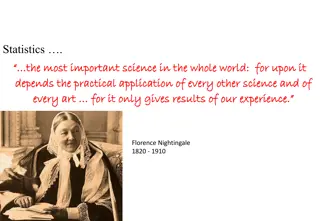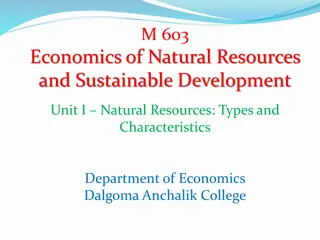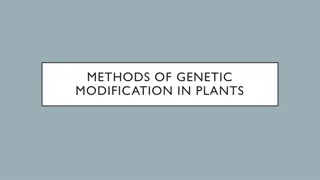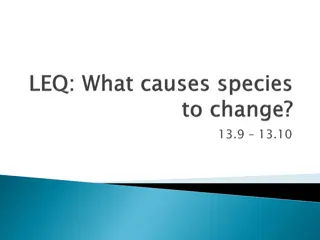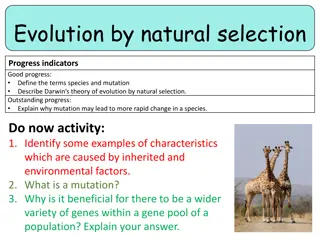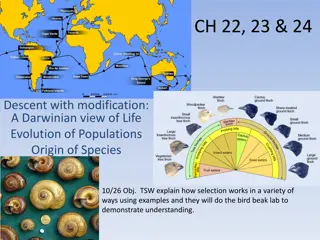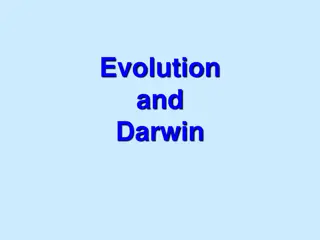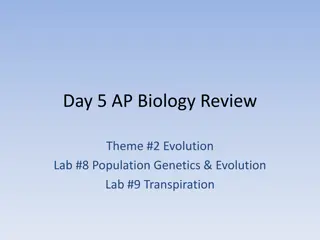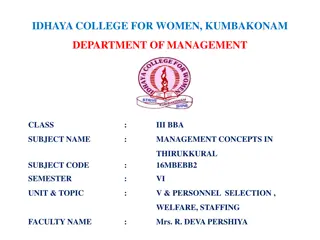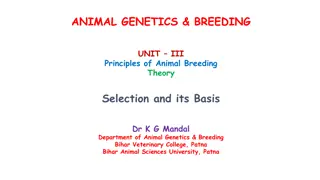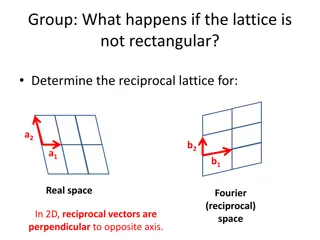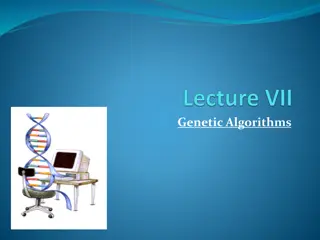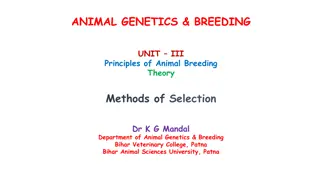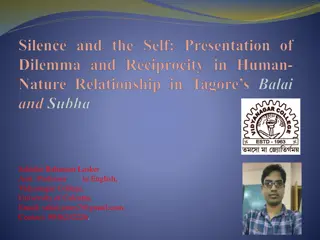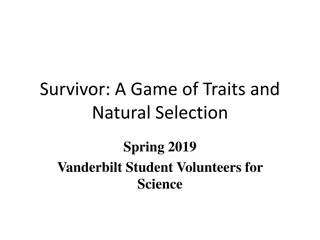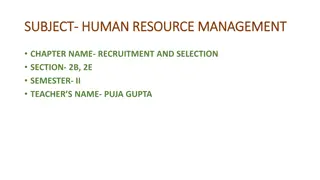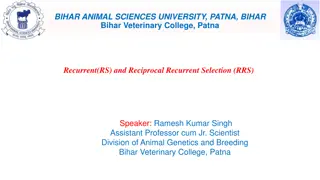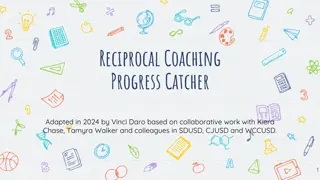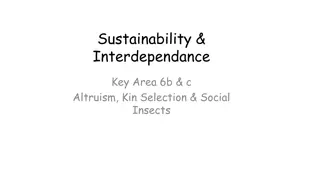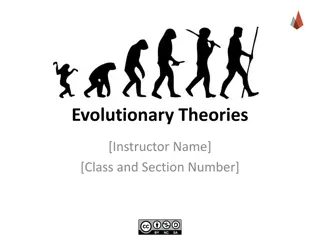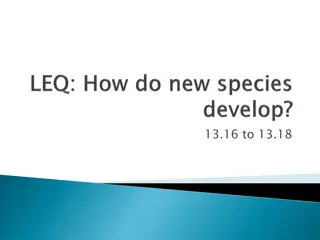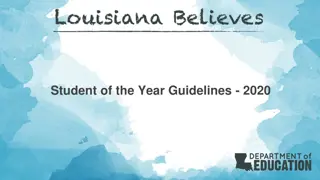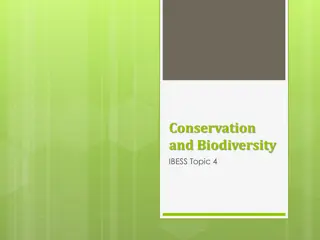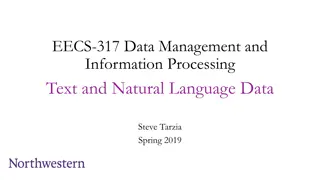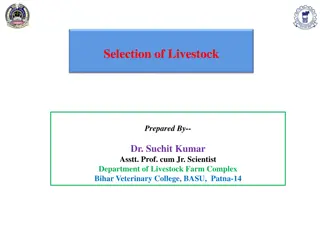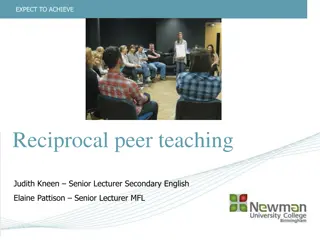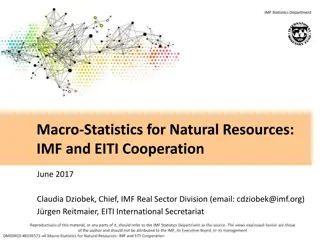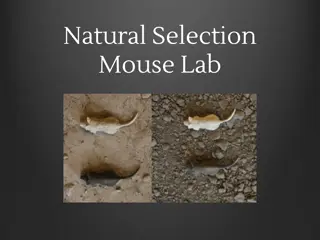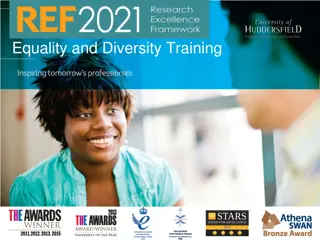INDIAN ARMY AGNIVEER SELECTION PROCESS 2024
https:\/\/youtube.com\/shorts\/3Errhs-10LM?si=gWwlhucXivM1v02s\n\n\n\nIndian Army Agniveer Selection Process 2024\nManasa Defence Academy is proud to offer the best Army training programs, including the NDA Crash Course (6 Months) and NDA Advance Course (1 Year). In this blog post, we will explore t
3 views • 1 slides
Understanding Logistic Regression Model Selection in Statistics
Statistics, as Florence Nightingale famously said, is the most important science in the world. In this chapter on logistic regression, we delve into model selection, interpretation of parameters, and methods such as forward selection, backward elimination, and stepwise selection. Guidelines for sele
4 views • 33 slides
Understanding Natural Resources and Resource Economics
Economics of natural resources focuses on the supply, demand, and sustainable allocation of the Earth's resources. It aims to develop a sustainable economy that protects natural resources for future generations. Natural resources are essential for human survival and include biotic and abiotic resour
0 views • 11 slides
The Best Odie's Natural Oil for Enhancing Wood Furniture Beauty
Wood furniture has a timeless appeal, adding warmth and elegance to any space. To maintain and enhance its beauty, using the right oil finish is crucial. Among the various products available, Odie\u2019s Natural Oil stands out as one of the best natural oils for wood furniture. This blog will delve
1 views • 4 slides
Different Methods of Genetic Modification in Plants
Genetic modification in plants can occur through natural selection, selective breeding, and induced mutations. Natural selection involves breeding compatible species to create offspring with desired traits, while selective breeding is a multi-generational process to breed organisms with specific cha
1 views • 11 slides
Understanding Evolutionary Mechanisms: Natural Selection, Genetic Drift, and Gene Flow
Exploring the forces behind evolutionary change, this content delves into natural selection, genetic drift, and gene flow. Examples such as the bottleneck effect, founder effect, and Amish population polydactylism are presented to illustrate how these mechanisms shape genetic diversity. The impact o
0 views • 14 slides
Understanding Evolution by Natural Selection
Explore the concepts of species, mutation, Darwin's theory of evolution, and the role of genetic variation through mutations. Learn how mutations can lead to rapid changes in species and why a wider variety of genes in a gene pool benefits a population. Delve into the effects of mutations on individ
0 views • 15 slides
Evolutionary Concepts and Natural Selection Explained
Descent with modification and natural selection play key roles in the process of evolution, as outlined by Darwinian principles. Through examples and historical context, the mechanisms of adaptation and survival of species are elucidated. The concept of variability within populations and the impact
0 views • 15 slides
Evolutionary Theories and Discoveries in Biology
Explore the concepts of evolution and Darwin's contributions to the field of biology. From Lamarck's inheritance of acquired characteristics to Darwin's theory of natural selection, delve into the processes that have shaped life on Earth. Discover how Darwin's observations on the Galapagos Islands l
1 views • 44 slides
Evolutionary Insights: AP Biology Review on Population Genetics and Natural Selection
Explore themes of evolution, population genetics, and natural selection in AP Biology, delving into concepts like Hardy-Weinberg equilibrium, allele frequencies, and the impact of natural selection on introduced species. Understand how molecular and cellular events lead to emergent properties at ind
0 views • 12 slides
Management Concepts in Personnel Selection and Welfare at Idhaya College for Women, Kumbakonam
The Department of Management at Idhaya College for Women in Kumbakonam offers insights into the importance of personnel selection in organizations. The process of personnel selection involves hiring individuals with the required qualifications to fill vacant positions. Proper selection and placement
0 views • 20 slides
Principles of Animal Breeding: Selection and its Basis
Selection in animal breeding involves choosing the best individuals to improve specific traits. Criteria for selection include individual merit, competitive exams, and interviews. Selection of farm animals focuses on non-random reproduction of genotypes. Types of selection include natural and artifi
1 views • 40 slides
Understanding Reciprocal Lattices in Crystal Structures
Explore the concept of reciprocal lattices in crystal structures, including non-rectangular lattices, Fourier space in 2D, Wigner-Seitz cells, Brillouin Zones, and the relationship between BCC and FCC structures. Learn about primitive lattice vectors, construction of the Brillouin Zone, and the sign
0 views • 49 slides
Understanding Genetic Algorithms and Natural Selection
Genetic Algorithms (GAs) are based on Darwin's Principle of Natural Selection. Introduced in the 1960s, they use evolutionary computing to optimize solutions. The process mimics nature, where the best traits survive and propagate, leading to the evolution of species. Through examples like giraffes a
0 views • 75 slides
Principles of Animal Breeding Theory and Methods of Selection
Animal breeding involves selecting for desirable traits to improve the overall merit of animals. Methods such as tandem selection and multi-trait selection are used to enhance genetic progress. Economic value, genetic significance, and selection criteria play important roles in the breeding process.
1 views • 16 slides
Exploring Nature and Human Relationships in Texts by Tagore
Ecocriticism in Tagore's works delves into the intricate dynamics between human, nature, and non-human elements. Nature is portrayed as a distinct entity, offering solace and companionship to characters like Balai and Subha in their silent yet profound interactions with the environment. Through uniq
0 views • 13 slides
Explore the Science of Natural Selection and Traits
Dive into the fascinating world of natural selection and traits with a focus on how organisms adapt to their environments. Learn about the importance of Charles Darwin's theories, the role of traits influenced by genes and the environment, and how natural selection drives the survival of the fittest
4 views • 13 slides
Recruitment and Selection Process in Human Resource Management
Recruitment and selection are vital processes in human resource management. Recruitment involves attracting candidates for job positions within an organization through various sources, both internal and external. The steps in recruitment include planning, strategy development, searching, screening,
0 views • 6 slides
Understanding Selection Strategies in Animal Genetics and Breeding
Genes influence traits through Additive Gene Action (AGA) and Non-Additive Gene Action (NAGA) in animal breeding. Recurrent Selection (RS) and Reciprocal Recurrent Selection (RRS) play crucial roles in improving animals. Selection for General Combining Ability (GCA) and Specific Combining Ability (S
0 views • 16 slides
Selection Board Training and Human Resources Responsibilities in Hawaii National Guard
This document outlines the agenda for the Selection Board Training conducted by the Hawaii National Guard Human Resources Office. It covers recruitment, selection processes, decision-making, and job offer responsibilities. References to relevant U.S. Codes and Acts are provided. The structure of the
0 views • 48 slides
HelmholtzCloud Service Selection Process Overview
The Helmholtz Cloud Service Selection Process is detailed through service surveys, iterations, criteria types, and exclusion processes. Service providers deliver data, weighting and selection criteria are applied, and candidate services are listed based on surveys and integrations. Criteria categori
0 views • 41 slides
Enhancing Internet Telephony Quality Through Predictive Relay Selection
Examining the quality of Internet telephony in relation to network performance, this research explores the use of Managed Overlay to improve call quality for services like Skype. Analysis of 430 million Skype calls reveals that a significant portion experience poor network performance, emphasizing t
1 views • 26 slides
Understanding Natural Selection in Higher Biology
Natural selection in action is demonstrated through mutations that impact an organism's adaptation to changing environments. Sickle cell anemia, a genetically transmitted blood disorder, exemplifies the consequences of specific mutations. The condition manifests in various symptoms, affecting indivi
0 views • 18 slides
Understanding Coevolution: An Example from Wild Parsnip and Webworms
Coevolution, a reciprocal evolutionary change in interacting species, can be observed in the relationship between wild parsnip plants containing toxic compounds and webworms that can metabolize these toxins. This example demonstrates the prerequisites for coevolution, including genetic variation and
0 views • 35 slides
Reciprocal Coaching Framework for Professional Development
The Reciprocal Coaching Framework, adapted in 2024 by Vinci Daro in collaboration with educators from several school districts, emphasizes setting goals, identifying teaching actions, and collecting artifacts to facilitate a structured coaching process. Partnerships are established, individual goals
0 views • 27 slides
Understanding Altruism, Kin Selection, and Social Insects in Sustainability
Altruism, kin selection, and social insects play crucial roles in sustainability. Altruistic behavior, like reciprocal altruism and kin selection, benefits recipients while potentially harming donors. Social insects, such as bees and ants, exemplify cooperation and societal structures that aid in ec
0 views • 29 slides
Understanding Evolutionary Theories and Strategies
Exploring evolutionary theories such as Sexual Selection Theory and Gene Selection Theory sheds light on how characteristics evolve for mating advantage. Insights into intersexual and intrasexual competition offer a deeper understanding of mate selection preferences. Gene selection mechanisms influe
0 views • 20 slides
Understanding Natural Selection and Its Mechanisms
Explore the concepts of natural selection, survival of the fittest, and various types of selection processes in evolutionary biology. From the struggle for existence to sexual selection, learn how organisms adapt to their environment through genetic contributions and mating strategies. Discover exam
0 views • 8 slides
Student of the Year Guidelines and Selection Process Overview
Explore the revised 2020 Student of the Year guidelines, understand the selection process for Grades 5, 8, and 12, learn about scoring form revisions, LEA roles, components, paperwork submission, and more. Get insights on starting the selection process and completing necessary forms. Discover how in
0 views • 23 slides
Interstate Reciprocal Overpayment Recovery Arrangement (IRORA) and Its Implementation
Explore the Interstate Reciprocal Overpayment Recovery Arrangement (IRORA), an agreement among participating states for the recovery of benefit overpayments through offsetting. Learn about the membership details, duties of requesting and recovering states, and the history of out-of-state overpayment
0 views • 17 slides
Exploring Biodiversity, Natural Selection, and Speciation in Conservation and Biodiversity (IBESS Topic 4)
Understanding biodiversity in ecosystems, the principles of natural selection according to Charles Darwin, and the concept of speciation. Explore the importance of genetic diversity, habitat diversity, and species diversity within ecosystems, and learn how natural selection drives evolution. Discove
0 views • 23 slides
Brigade Commander and Staff Selection Process Decision Briefing
In the decision briefing for the selection process of APS JROTC Brigade Commander and Staff, the purpose is to determine the best process that meets the needs, constraints, and preferences. The plan is to implement a standardized nomination and evaluation process in the selection of Brigade Commande
0 views • 18 slides
Understanding Natural Language Data Processing
Exploring aspects of natural language data, covering topics like the differences between natural and formal languages, challenges in processing natural languages for machines, and examples of dealing with natural language data such as Yelp reviews. The content also touches on big data concepts, hash
0 views • 26 slides
Understanding Selection Methods in Livestock Breeding
Livestock breeding involves various methods of selection such as individual selection, pedigree selection, progeny selection, and more. These methods aim to improve desirable traits in animals through controlled breeding programs. Selection criteria include performance, genetic lineage, and specific
0 views • 27 slides
Enhancing Learning Through Reciprocal Peer Teaching in Higher Education
This presentation discusses the concept of reciprocal peer teaching in higher education, focusing on how students can take on teaching roles to enhance their learning experience. The speakers emphasize the benefits and strategies of peer teaching, providing a framework for implementing this approach
1 views • 20 slides
IMF Statistics Department - Natural Resources Statistical Tools
IMF Statistics Department has developed two statistical tools, the Revenue Template and National Accounts Template, to help countries analyze government revenues and natural resources in national accounts. These tools are crucial for policymaking in countries heavily reliant on natural resource reve
0 views • 9 slides
Natural Selection Mouse Lab: Understanding Species Changes Over Time
In this natural selection mouse lab, students investigate how species evolve over time by simulating genetic variations and environmental influences. By manipulating allele cards and event cards, students observe how different color variations of mice fare in white and brown sand environments. The l
0 views • 13 slides
Insights into Evolution, Natural Selection, and Cancer Mutation
Explore the concepts of evolution, natural selection, and cancer mutation through detailed descriptions and illustrations. Learn about the evolutionary processes that drive diversity in biological populations, the role of natural selection in shaping traits, and the mechanisms behind cancer developm
0 views • 20 slides
Vigil Nomination and Selection Process Overview
The Vigil Nomination and Selection Process involves processes at both the chapter and lodge levels, including the appointment of chairman and adviser, duties of the nominating committee, eligibility criteria, survey letters, nominee selection, completing nomination forms, and deadlines for submissio
0 views • 30 slides
Challenges in Staff Selection for Equality and Diversity in Academic Institutions
Despite some progress, challenges persist in the selection of staff in academic institutions, particularly concerning under-selection of minority ethnic staff and those with disabilities. The report highlights disparities in selection rates based on gender, age, nationality, and ethnicity. Addressin
0 views • 27 slides

